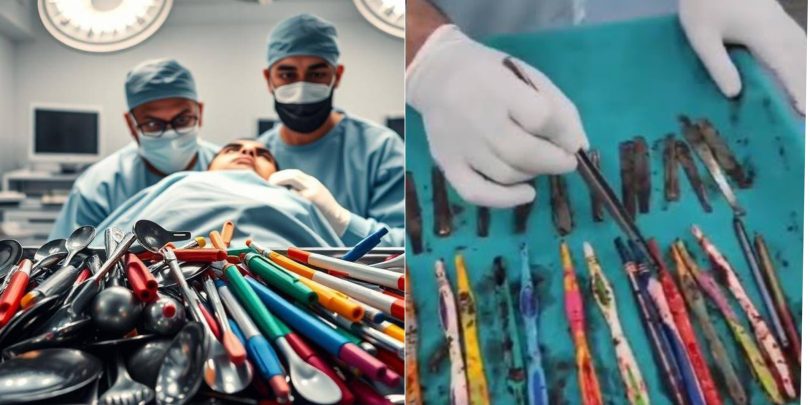Doctors at Devnandani Hospital in India were taken aback when a 40-year-old man from Hapur was admitted with severe stomach pain.
Scans revealed an unusual sight, dozens of foreign objects, including steel spoons, toothbrushes, and pens, lodged inside his abdomen.

A surgical team led by Dr. Shyam Kumar carried out a five-hour operation, during which they removed a total of 50 items: 29 steel spoons, 19 toothbrushes, and two pens.
According to hospital staff, the incident came to light on September 17 after the patient’s family rushed him to the facility, reporting symptoms of abdominal pain, vomiting, and weakness. The man is said to be recovering following the rare and shocking procedure.
“When we performed the ultrasound, X-ray and CT scan, we were stunned to see metallic and plastic objects inside his stomach. I have never seen so many foreign bodies in one patient,” Dr. Kumar reported to the media.
Officials revealed that the 40-year-old man from Hapur had a history of substance abuse and had recently been admitted to a de-addiction centre in Ghaziabad, about a month ago.
According to reports, the man became upset after being left at the centre and, in protest, began swallowing everyday objects. Speaking to reporters after his surgery, he admitted, “I would pick them up and go to the washroom to swallow them.”
Unusual habit of breaking off toothbrush heads
Doctors further disclosed that during the operation they discovered the heads of the spoons and toothbrushes had been broken off before ingestion, making the case even more unusual. The man is currently under observation as he recovers from the rare and dangerous ordeal.
“There were about 28 spoon parts, along with 21 head-less brush parts and two pens,” Dr. Kumar stated.
Mental health experts suggest psychological condition
Medical experts have suggested that the man’s actions may be tied to an underlying psychiatric condition, possibly pica disorder, a compulsive eating disorder characterized by the consumption of non-food items.
They explained that while pica is more commonly seen in children, it can also occur in adults, often linked to stress, mental health challenges, or nutritional deficiencies. In this case, his history of substance abuse and recent stay at a de-addiction centre may have contributed to the unusual behaviour.

